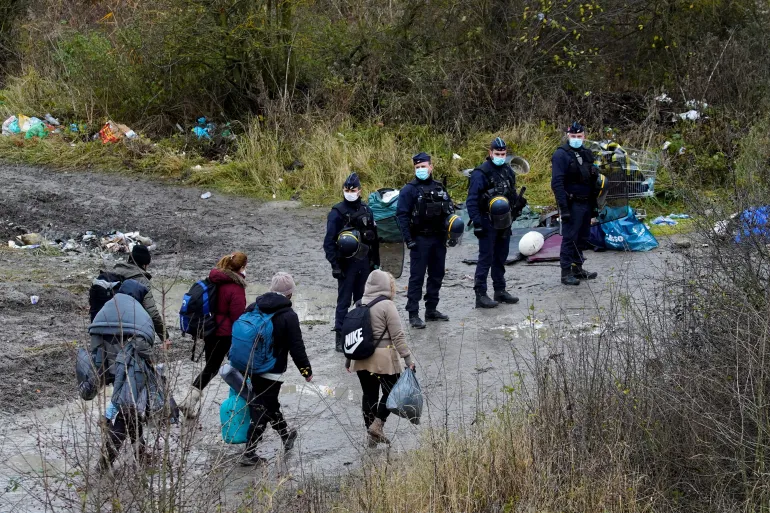The nexus between Migration and Inclusive Policies emerges as a crucial focal point in the dynamic tapestry of human communities. In light of the remarkable changes in the global population and the movement of individuals across national boundaries, it is imperative that we promote inclusive frameworks. Migration is a complex phenomena that crosses national boundaries, blending cultures and fates. Inclusive policies are the conductors in this complex dance of movement, sculpting the harmony that characterizes civilizations.
A story of social evolution and adaptation is revealed by examining the complex interaction between Migration and Inclusive Policies. It urges a reevaluation of policies that encourage fair participation and bridge disparities, as well as an exploration of the opportunities and difficulties presented by migration. As we begin this investigation, the dance between Migration and Inclusive Policies invites us to identify the strands that intertwine into a worldwide web of harmony, tolerance, and wealth.

Quick Navigation
Integration Through Inclusive Policies
Migration and Inclusive Policies offer a framework that recognizes and meets the different needs of migrants, hence fostering a sense of belonging among them. These regulations strive for true integration rather than just tolerance. When implemented well, inclusive policies foster a culture that values the contributions and abilities of immigrants. Social cohesiveness is based on mutual understanding and collaboration between the host community and newcomers, which is fostered by this acknowledgment.
The path to integration is not without difficulties, though. Implementing inclusive policies for various immigrant populations presents a number of complex difficulties that need for all-encompassing solutions.
Difficulties with Implementation:
Language obstacles, cultural disparities, and structural injustices are obstacles faced by inclusive policies and migration. In order to overcome these obstacles, one must be dedicated to ending discriminatory behaviors and guaranteeing fair access to resources. In addition, authorities need to be aware of the varied requirements of migrants, taking into account aspects like age, gender, and socioeconomic status. It’s a constant struggle to find a balance when developing policies that are both inclusive and focused enough to handle particular issues.
Migration policies need to be properly designed in order to support economic inclusion and equitable opportunity for all.
Equal opportunities and economic inclusivity:
When inclusive policies and migration prioritize fostering an environment where all people, regardless of immigration status, have access to opportunities, they can act as catalysts for economic growth and success. Economic inclusion is facilitated by policies that emphasize education, skill development, and the removal of barriers to employment. Host societies may capitalize on diversity by acknowledging the potential of migrants and creating opportunities for their economic involvement.
Yet striking a careful balance is necessary to achieve economic inclusiveness. Inclusive policies and migration should take into account the worries of the current workforce as well as the financial requirements of migrants. Maintaining this equilibrium guarantees that the advantages of migration are dispersed fairly throughout the community.
Inclusive policies and migration are essential in tackling the social and cultural obstacles that newly arrived migrants frequently encounter in their new surroundings.
Read Also:11 Best Online Knitting Classes for Beginners And Advanced
Overcoming Cultural and Social Barriers:
Policies that are inclusive serve as links between disparate groups and promote social cohesiveness. These laws can foster cross-cultural dialogue and comprehension and advance an inclusive society where individuals’ differences are valued rather than ostracized. Programs like language learning, community service, and cultural understanding are essential parts of inclusive policies that assist in removing social barriers.
On the other hand, overcoming social and cultural obstacles is an ongoing effort. It necessitates constant learning, communication, and a dedication to debunking misconceptions. Initiatives that provide forums for conversation and mutual education should be vigorously supported by inclusive policies and migration in order to build a sense of unity within differences.
Achieving inclusive migration policies while balancing national security concerns is a difficult issue for policymakers.
Juggling Fears About National Security:
Maintaining inclusive policies and safeguarding national security need careful balance. This is especially true when it comes to migration. The difficulty faced by policymakers is putting border security measures into action without continuing exclusion or discrimination based on immigration status or nationality.
By implementing targeted, appropriate, and human rights-respecting security measures, effective policies achieve a balance. They understand that discriminatory actions shouldn’t be justified by security concerns. Building confidence between the state and migrants is facilitated by policies that support accountability and openness in security measures, which encourage security without sacrificing inclusivity. This is how migration and inclusive policies work together.
Promoting peaceful and thriving societies requires both immigration and inclusive policies. Through tackling social and cultural barriers, fostering economic inclusivity, and addressing implementation issues, policymakers can foster situations where diversity is not only welcomed but also utilized as a source of strength and energy.
Policymaking must be deliberate and sophisticated in order to strike a delicate balance between inclusion and national security considerations. In the end, the constant focus on inclusive policies and migration highlights their crucial role in creating a society in which the flow of people is determined by shared prosperity, equity, and understanding.
Tomorrow’s Navigation: The Vital Intersection of Migration and Inclusive Policies
The interaction between Migration and Inclusive Policies emerges as a key factor influencing the patterns of societies in the constantly changing global landscape. The history of our globalized society is shaped by the convergence of inclusive policies—a contemporary necessity for social harmony—and migration, a phenomenon as old as mankind itself. In this essay, the many facets of Migration and Inclusive Policies are examined, along with their mutually beneficial relationship, difficulties, and possibility for transformation.
Read Also: All You Need To Know About Becoming A Certified Ethical Hacker
The Concept of Migration and Inclusive Policies:
A wide range of tactics are included in Migration and Inclusive Policies with the goal of easing the assimilation of various groups into host communities. Being inclusive means actively embracing and accommodating differences rather than just accepting them. Given the current state of the world, where cross-border mobility is inevitable, inclusive policies play a critical role in ensuring that the advantages of migration are distributed fairly.
Fostering Social Unity:
In order to promote social cohesiveness within various communities, Migration and Inclusive Policies are crucial. Policies that promote inclusivity foster a culture in which immigrants are viewed as essential members of society rather than as outsiders. This strategy closes the gap between the arrivals and the host community by fostering a sense of belonging. Through unity and acceptance of diversity, societies can strengthen and become more resilient.
Overcoming Social and Cultural Barriers:
For migrants, social and cultural hurdles frequently provide obstacles on their path to integration. Inclusive policies are essential in breaking down these barriers because they foster mutual respect, understanding, and cross-cultural exchange. Language learning programs, community involvement projects, and cultural sensitivity campaigns are essential parts of laws intended to promote tolerance and lessen discrimination. The constant emphasis on Migration and Inclusive Policies highlights their potential for transformation in removing these obstacles.
Difficulties with Implementation:
Although Migration and Inclusive Policies have laudable goals, there are several obstacles in the way of their successful implementation. It is imperative to acknowledge and tackle these obstacles in order to develop policies that are inclusive both in theory and in actual application.
Cultural Sensitivity
Navigating the subtleties of cultural differences is one of the problems. Policies that are inclusive must take cultural sensitivity into account, taking into account the varied origins and customs of immigrants. Feelings of exclusion might result from a failure to acknowledge and accept these differences, which can impede the integration process.
Fair Allocation of Resources:
Allocating resources equitably is another obstacle. Policies that promote inclusivity should make sure that everyone in society has equitable access to resources like work, healthcare, and education, irrespective of their immigration status. Maintaining this equilibrium is essential to avoiding the marginalization of particular groups in society.

Equal opportunities and economic inclusivity:
Migration and Inclusive Policies have a large economic component as well. Developing policies that support economic inclusion and equitable opportunity for all calls for a methodical and thorough approach.
Career and Skill Development Opportunities:
Programs for skill development that enable migrants to make significant contributions to the host society can be given priority in Migration and Inclusive Policies. Policies that guarantee equitable access to opportunities and remove impediments to employment promote economic inclusion. The frequent mention of Migration and Inclusive Policies emphasizes their function as creators of a level playing field in the economy.
Innovation and Entrepreneurship:
Promoting innovation and entrepreneurship is another aspect of promoting economic inclusiveness. By leveraging the different viewpoints of migrant entrepreneurs, inclusive policies may foster an atmosphere that promotes economic success. Societies can unleash the full potential of their varied populations by fostering inclusion in business and innovation.
Juggling Fears About National Security:
Migration and Inclusive Policies must navigate the fine line between preserving inclusivity values and protecting national security. The difficult task of striking this balance between protecting citizens’ safety and preventing prejudice falls to policymakers.
Specific Security Protocols:
Policies should implement targeted, reasonable, and human rights-respecting actions in order to address national security concerns. The significance of security measures that do not jeopardize the inclusive nature of the policies is highlighted by the constant emphasis on Migration and Inclusive Policies.
Accountability and Transparency:
Building trust between the state and migrants requires maintaining accountability and transparency in security procedures. Security is enhanced by inclusive policies that are transparent in their goals and responsible in their execution, all without compromising their inclusiveness.
Recommended
- 11 Best Online Knitting Classes for Beginners And Advanced
- Owens And Xley Consults Recruitment Form 2024/2025 | Full Guide
- Why A Firm Should Hire Dedicated Development Team | 2024
- Online Learning for Skill Development and Career Advancement
Migration and Inclusive Policies: Additionally
Societies discover the beat of their shared destiny in the complex dance of Migration and Inclusive Policies. A dedication to universal values is necessary to successfully navigate the issues of national security, economic inclusion, and cultural integration. This investigation’s recurrent focus on Migration and Inclusive Policies serves as a reminder of their importance in creating a society that values variety and views it as a source of strength rather than a cause of conflict. The intersection of Migration and Inclusive Policies challenges us to construct a path toward harmony, mutual understanding, and shared prosperity as we stand at the crossroads of the future.
SEE ALSO:
Trust you found our article on Migration and Inclusive Policies helpful. Follow our website for more interesting articles.

